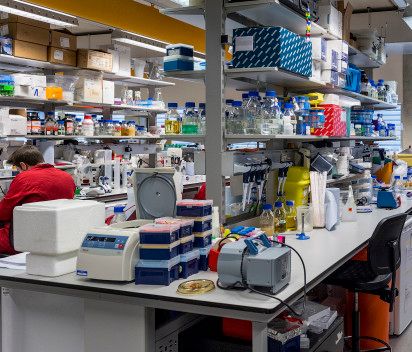BibTex format
@article{Chambonnier:2016:10.1371/journal.pgen.1006032,
author = {Chambonnier, G and Roux, L and Redelberger, D and Fadel, F and Filloux, A and Sivaneson, M and de, Bentzmann S and Bordi, C},
doi = {10.1371/journal.pgen.1006032},
journal = {PLOS Genetics},
title = {The Hybrid Histidine Kinase LadS Forms a Multicomponent Signal Transduction System with the GacS/GacA Two-Component System in Pseudomonas aeruginosa.},
url = {http://dx.doi.org/10.1371/journal.pgen.1006032},
volume = {12},
year = {2016}
}
RIS format (EndNote, RefMan)
TY - JOUR
AB - In response to environmental changes, Pseudomonas aeruginosa is able to switch from a planktonic (free swimming) to a sessile (biofilm) lifestyle. The two-component system (TCS) GacS/GacA activates the production of two small non-coding RNAs, RsmY and RsmZ, but four histidine kinases (HKs), RetS, GacS, LadS and PA1611, are instrumental in this process. RetS hybrid HK blocks GacS unorthodox HK autophosphorylation through the formation of a heterodimer. PA1611 hybrid HK, which is structurally related to GacS, interacts with RetS in P. aeruginosa in a very similar manner to GacS. LadS hybrid HK phenotypically antagonizes the function of RetS by a mechanism that has never been investigated. The four sensors are found in most Pseudomonas species but their characteristics and mode of signaling may differ from one species to another. Here, we demonstrated in P. aeruginosa that LadS controls both rsmY and rsmZ gene expression and that this regulation occurs through the GacS/GacA TCS. We additionally evidenced that in contrast to RetS, LadS signals through GacS/GacA without forming heterodimers, either with GacS or with RetS. Instead, we demonstrated that LadS is involved in a genuine phosphorelay, which requires both transmitter and receiver LadS domains. LadS signaling ultimately requires the alternative histidine-phosphotransfer domain of GacS, which is here used as an Hpt relay by the hybrid kinase. LadS HK thus forms, with the GacS/GacA TCS, a multicomponent signal transduction system with an original phosphorelay cascade, i.e. H1LadS→D1LadS→H2GacS→D2GacA. This highlights an original strategy in which a unique output, i.e. the modulation of sRNA levels, is controlled by a complex multi-sensing network to fine-tune an adapted biofilm and virulence response.
AU - Chambonnier,G
AU - Roux,L
AU - Redelberger,D
AU - Fadel,F
AU - Filloux,A
AU - Sivaneson,M
AU - de,Bentzmann S
AU - Bordi,C
DO - 10.1371/journal.pgen.1006032
PY - 2016///
SN - 1553-7390
TI - The Hybrid Histidine Kinase LadS Forms a Multicomponent Signal Transduction System with the GacS/GacA Two-Component System in Pseudomonas aeruginosa.
T2 - PLOS Genetics
UR - http://dx.doi.org/10.1371/journal.pgen.1006032
UR - http://hdl.handle.net/10044/1/33084
VL - 12
ER -
